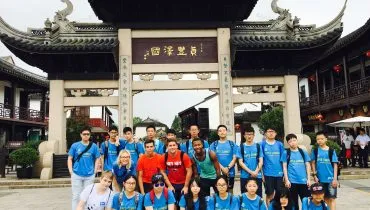Embark on your study abroad experience in China—one of the most an awe-inspiring, friendly and delightful countries. Discover its blend of traditional and modern: centuries-old temples surrounded by gleaming skyscrapers, colorful street food and imperial palaces, striking natural formations and ancient pagodas.
Like most teenagers in China, you will probably focus on school and studying. School is also a great place to make friends who will share their culture with you. Chinese teenagers get together at friends’ homes, go to movies, dance, watch television or play sports like soccer, basketball and ping-pong. Parents are usually very involved in students’ lives, so you should always check with your host family before you go out. Chinese teenagers seldom date and prefer to socialize with their classmates in single-sex groups.
AFS Youth exchange in China

